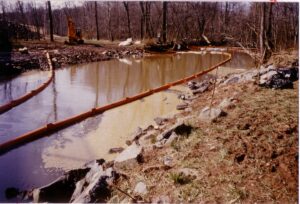PRESS RELEASE
March 28, 2023
A PDF of this press release is available here.
On this day in 1993, an oil spill in a suburban Virginia town wreaked havoc on the Potomac River. It put drinking water at risk, created toxic fumes, and decimated local wildlife. The Interstate Commission on the Potomac River Basin (ICPRB) explores the impacts on drinking water resources that endure three decades later.
Thirty years ago today, a pipeline owned by Colonial Pipeline Co. — which runs from Texas to New York — ruptured and spilled almost 408,000 gallons of fuel oil in a suburban area of Northern Virginia. Contemporary reports note a geyser of oil the height of a 10-story building was observed behind a local hospital. Oil flowed into the local creek, Sugarland Run, and quickly found its way to the Potomac River, just upstream of drinking water intakes.
According to Congressional hearings, the disaster caused severe impacts on wildlife and national parklands. It resulted in $25 million in clean-up costs and a multimillion-dollar settlement with the Federal government, Washington, D.C., and Virginia. Pockets of oil were detected as far down the Potomac River as Quantico, Va.
An ICPRB article written at the time states that due to high flows and a quick response from emergency personnel, the spilled oil was quickly removed or dispersed, however, Fairfax Water’s drinking water intake on the Potomac was forced to shut down for almost two weeks.
“While our spill notification system has improved since that time, our region’s drinking water is still vulnerable to contamination events,” said Mike Nardolilli, ICPRB’s Executive Director.
According to Nardolilli, the Potomac River supplies 78% of the Washington, D.C. metropolitan area’s public drinking water. Moreover, D.C. and Arlington only have a one-day supply of back-up water should the Potomac River become unavailable due to drought or contamination.
“This anniversary reminds us that we need to make our water supply more resilient by supplementing our existing sources of drinking water,” added Nardolilli.
In a step towards resiliency, Congresswoman Eleanor Holmes Norton (D-DC) included provisions to explore supplemental storage options for D.C.-area residents in the recent Water Resources Development Act of 2022. Funding for that study, estimated to cost $3 million and take three years, still must be appropriated.
Noting the anniversary of the Colonial Pipeline spill, Congresswoman Norton asserted,
“There is an urgent need for Congress to appropriate the necessary funds to study how to protect the drinking water in the National Capital Region from serious vulnerabilities like what occurred on March 30, 1993.”
A presentation with more information on this event was given during the recent ICPRB Commission Meeting on March 7, 2023. A video of the presentation can be found on the ICPRB YouTube page.

